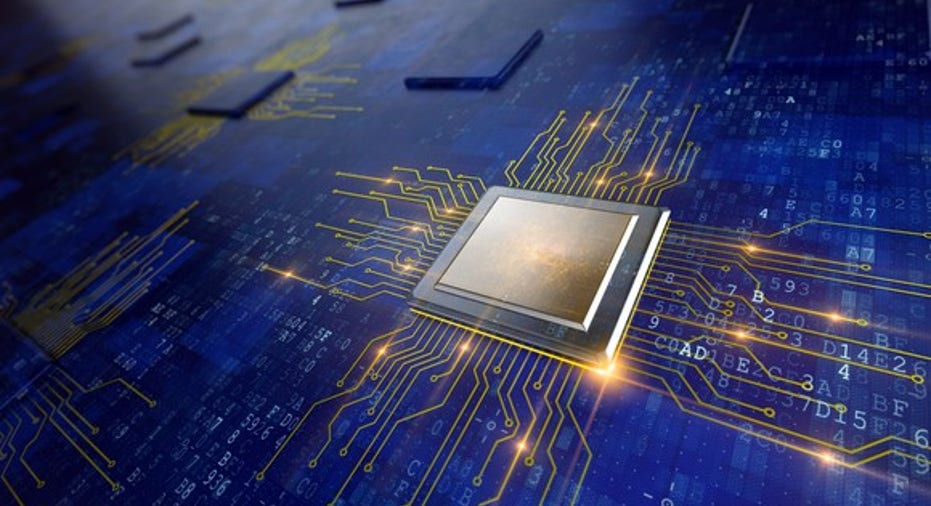Report: Apple Inc. May Tap Intel Corporation for Future A-Series Chip Manufacturing

Image source: Getty.
Just a few days ago, I penned a column speculating on whether smartphone giant Apple (NASDAQ: AAPL) would tap microprocessor specialist Intel (NASDAQ: INTC) for the manufacture of iPhone-bound applications processors at some point in the future.
According to a report from Nikkei, citing comments from Gartneranalyst Samuel Wang, Intel has "begun to engage with Apple" for such foundry work. The analyst also believes that Intel "is likely to gain orders from Apple" by either 2018 or 2019.
The foundry jackpot
Until now, most of the contract chip manufacturing deals that Intel has made public have been ones with seemingly limited volume and revenue potential to Intel. However, winning a significant portion of Apple's A-series chip business would bring meaningful revenue to the company. It would also allow Intel to control an even greater portion of the industrywide unit volumes on cutting-edge chip manufacturing technology.
If we assume that Apple pays around $22 per A-series processor (this is the estimate put out there by IHS Technology), then at around 200 million units shipped per year, the revenue opportunity for the manufacture of these processors works out to roughly $4.4 billion per year.
If Intel can get this deal done (something that, frankly, I'd have to see to believe), grabbing a piece of that pie would be a positive for the company and its stockholders.
A potential positive for Apple
Readers may remember a recent report from DIGITIMES claiming that Apple is trying to squeeze its suppliers for iPhone 7 component orders. That same report said that Apple wasn't going to try to squeeze Taiwan Semiconductor Manufacturing Company (NYSE: TSM) "simply because it is difficult for Apple to find alternative sources to replace TSMC."
If Intel can become a credible second source to TSMC for A-series contract chip manufacturing, then Apple may be able to get better pricing on these chips.
That better pricing could allow Apple to either expand its gross profit margins per device (even a few dollars saved across hundreds of millions of units adds up to a non-trivial amount of incremental gross profit) or it could allow Apple the freedom to pack even more features and functionality into its chips at roughly the same manufacturing cost.
A potential negative for TSMC
If Intel does, in fact, wind up winning some A-series processor orders from Apple, this would be a negative for TSMC. I wouldn't expect Intel to become the primary source for A-series chips in the event that Apple actually uses Intel, but going from 100% allocation to TSMC (as is widely expected for the upcoming A10 and the follow-on A11 chips) to, say, 60%-70% allocation would hurt year-over-year revenue comparisons.
Additionally, with Intel in the mix, TSMC might have to price more aggressively, which would drive down average selling prices and, potentially, gross profit margins on the chips that Apple does buy from TSMC.
That being said, I would be very careful about predicting gloom and doom for TSMC. The company's execution over the last several years has been nothing short of excellent, and I expect that the chip manufacturer will continue to very aggressively push technology development in a bid to try to keep all of Apple's orders (as well as orders from other top mobile customers) flowing through its factories.
A secret billion-dollar stock opportunity The world's biggest tech company forgot to show you something, but a few Wall Street analysts and the Fool didn't miss a beat: There's a small company that's powering their brand-new gadgets and the coming revolution in technology. And we think its stock price has nearly unlimited room to run for early in-the-know investors! To be one of them, just click here.
Ashraf Eassa owns shares of Intel. The Motley Fool owns shares of and recommends Apple and Gartner. The Motley Fool has the following options: long January 2018 $90 calls on Apple and short January 2018 $95 calls on Apple. The Motley Fool recommends Intel. Try any of our Foolish newsletter services free for 30 days. We Fools may not all hold the same opinions, but we all believe that considering a diverse range of insights makes us better investors. The Motley Fool has a disclosure policy.



















